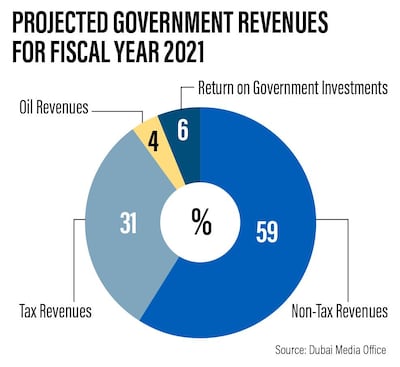Sheikh Mohammed bin Rashid, Vice President and Ruler of Dubai, approved the emirate’s general budget for next year that allocates Dh57.1 billion for spending.
Public revenue is forecast to reach Dh52.31bn, despite a reduction or freezing of fees to boost the economy, the government said on Sunday.
Next year's budget is marginally lower than the record Dh66.4bn in spending allocated for spending during the current fiscal year.
The new budget takes into account the “exceptional economic conditions” during the 2020 fiscal year and the repercussions of the Covid-19 pandemic on the global economy, the government said.
“The 2021 budget comes in response to the requirements for recovery and dealing with the postponement of Expo 2020 Dubai,” said Arif Ahli, executive director of planning and the general budget sector in Dubai’s Department of Finance.
“It also reflects the emirate’s financial stability through its implementation of financial policies as per best global practice.”
Dubai unveiled stimulus and economic support measures worth Dh6.8bn to soften the pandemic’s blow and help businesses and people.
The emirate's economy will contract by 6.2 per cent this year due to the coronavirus-induced slowdown, before expanding by 4 per cent next year, according to earlier government projections.
Salaries and allowances will account for 35 per cent of spending in 2021 as the government moves to ensure family and community stability.
The emirate will spend about a quarter of the budget on grants and financial support for community development and public services. Another fifth of the budget has been earmarked for general and administrative expenses while 9 per cent will maintain infrastructure investment levels.
“This comes alongside the completion of some projects, the activation of the public-private partnership law and the development of project-financing mechanisms in Dubai government through long-term financing,” the government said.
The private reserve received an allocation of 1 per cent of total expenditure to prepare for the effects of the crisis.
The government allocated 6 per cent to service public debt as it follows “a disciplined fiscal policy that ensures the budget fulfils all obligations”.
Another 3 per cent was set aside for capital expenses, it said.
By sector, the 2021 budget earmarked 31 per cent for health, education and housing, the well-being of women and children and the development of reading and coding initiatives.
Another 22 per cent will be spent on initiatives to support security, justice and safety in the emirate.
Dubai will also spend 41 per cent of the budget on infrastructure and transport while innovation, creativity and scientific research will receive a combined 6 per cent of the budget.
The government said its forecast of Dh52.31bn in public revenue is based on ongoing operations in the emirate and does not rely on oil revenue.
Oil revenue accounts for 4 per cent of the total revenue expected in the 2021 fiscal year.
Non-tax income, which comes from government fees, accounts for 59 per cent of the revenue while tax accounts for 31 per cent and government investment revenue accounts for 6 per cent.
The 2021 budget “sends a clear message to the business community that Dubai is pursuing an expansionary fiscal policy, which contributes to strengthening confidence in the emirate’s economy and attracting more direct investments”, the government said.
Dubai, a financial and tourism hub in the Middle East, began a free mass inoculation campaign with the Pfizer-BioNTech vaccine last week.
The pandemic has plunged the global economy into its deepest recession since the 1930s.
The UAE Central Bank estimates that the country will grow by 2.5 per cent in 2021 as the economy continues to recover from the coronavirus-induced slowdown.
The rebound of the Arab world’s second-largest economy next year will be led by a 3.6 per cent expansion in the non-oil sector, the banking regulator said in its third-quarter economic review.



